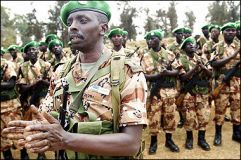UN official wants larger force in Darfur soon
By Evelyn Leopold
UNITED NATIONS, April 30 (Reuters) – The African Union’s decision to triple its force in Sudan’s Darfur region was a “big step” but falls short of what is needed to protect civilians and quell violence, a senior U.N. official said.

|
|
Picture taken 14 August 2004 of Rwandan troops, who helped observe a ceasefire between the government and rebels groups in Darfur. (AFP) . |
Nevertheless, Jan Egeland, the emergency relief coordinator, said, “We have a window of opportunity for Sudan which we cannot fail to use. The stakes are incredibly high.”
“It’s the first real commitment to radically increase what we have there today,” he said in an interview on Friday. “It’s a big step in the right direction.”
The Africa Union, the main bulwark against atrocities in Darfur, has 2,200 troops, police and observers in a region the size of France. It decided on Thursday to increase its force to 7,700 by the end of September and reach 12,300 by the spring of 2006. NATO nations are to increase assistance with vehicles and helicopters.
But Egeland said it was frustrating that African Union soldiers, considered aggressive and thoughtful, were spread so thin in Darfur, 23 months after a decision was made to set up the force. Humanitarian workers number about 11,000.
“In our view there should be as many soldiers and police as (relief) workers if civilian populations are really going to be protected and the militia are going to be disarmed,” he said.
The Darfur conflict broke out in February 2003 after rebels took up arms against the Arab-dominated government, complaining of discrimination. Khartoum is accused of retaliating by arming local Arab militia, known as Janjaweed, who burned down villages and slaughtered and raped civilians.
At least 180,000 people have died from violence, hunger and disease and 2 million have been driven out of their homes, most into squalid camps.
Peace talks between the various groups and the government are nearly non-existent, while splinter groups, under no one’s control, are multiplying.
Hopefully, more vehicles and helicopters would make the African Union troops more mobile, Egeland said. He contended the brutal attack on the village of Khor Abeche on April 7, where Arab militia killed, looted and scorched homes, was avoidable.
“There were ample warning signals but no one was able to intervene,” he said.
Another problem, he said, was a shortage of funds despite generous pledges, for southern Sudan and Darfur. The United Nations has received some 28 percent of the 1.5 billion requested so “we are appealing for donors to front load” their pledges, Egeland said.
“We are hanging in by our finger nails in many areas, surrounded by militia and armed gangs,” he said. “Time is not on our side because we have more and more armed groups that seem to take orders from no one.”
